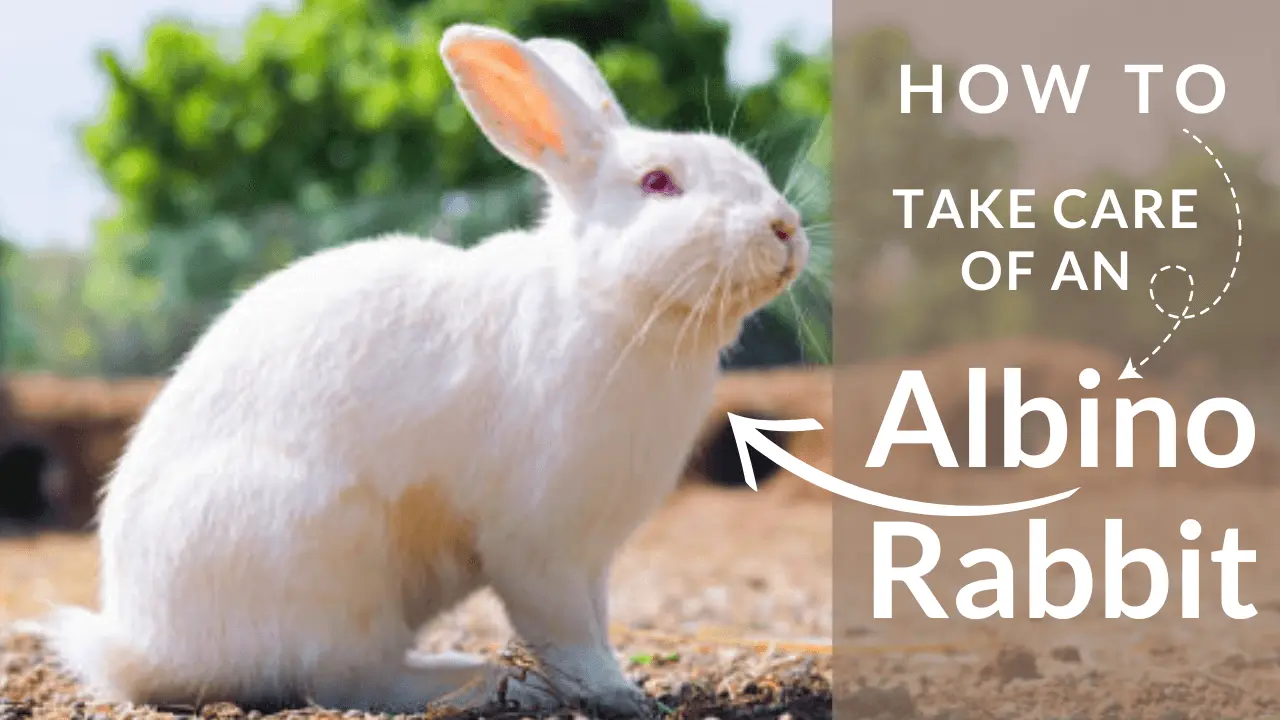Special care is required to care for albino rabbits. The albino rabbit with its distinctive white fur and striking pink or red eyes albino rabbits are beautiful and gentle pets but Albino rabbits do require a little more attention than other rabbits.
Because of their lack of melanin and are therefore more susceptible to sunlight and to certain health problems. A safe and cozy environment a well-balanced diet and regular health care are essential for take care of an albino rabbit.
In this comprehensive guide covers best practices for raising, feeding, grooming, and caring for take care of an albino rabbits to help you create a loving home for your special pet. Whether you are a first-time rabbit owner or are looking to improve your care routine. These tips will help keep your albino rabbit healthy and happy.
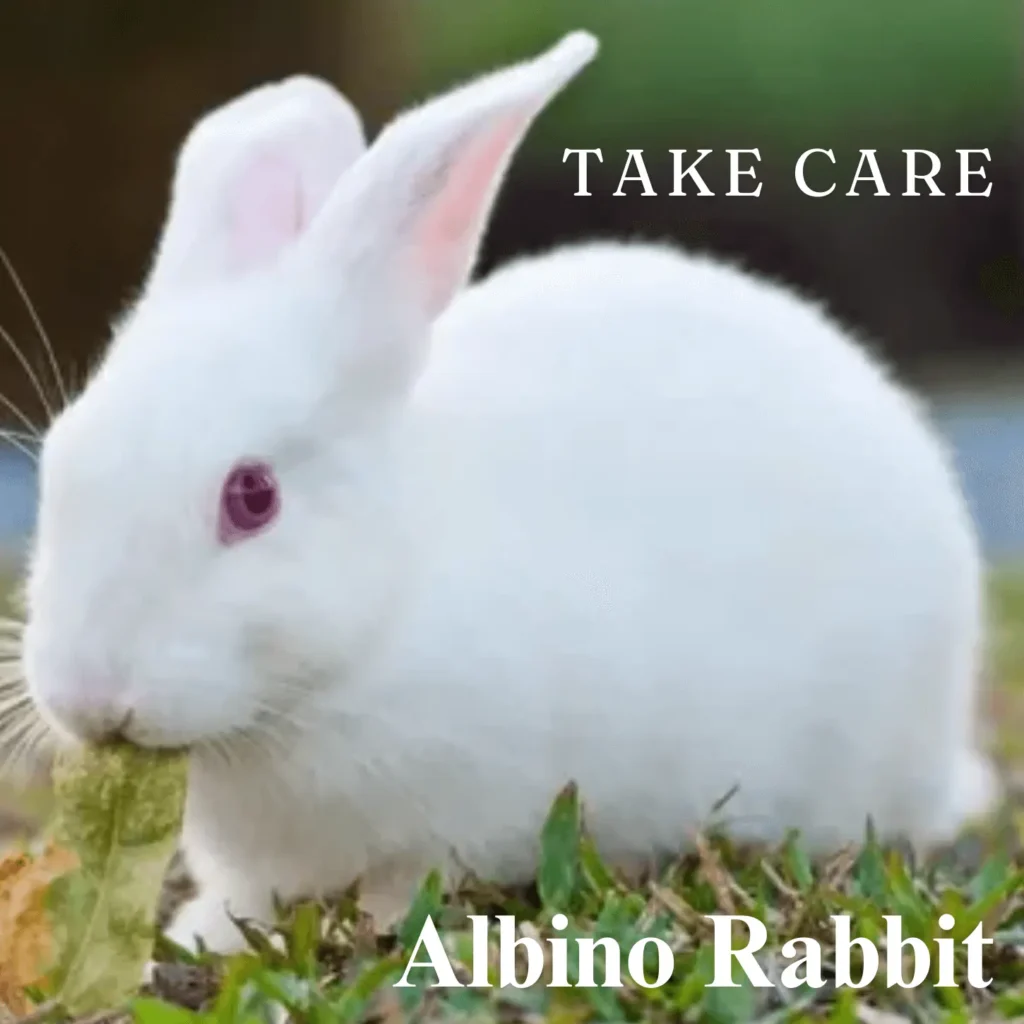
Understanding Albino Rabbits Breed:
Albino rabbits lack melanin the pigment that colors their fur, skin, and eyes. This genetic condition results in their characteristic white fur and red or pink eyes. The lack of melanin makes albinism rabbits vulnerable to sunlight and prone to some health problems. Knowing these properties is essential for proper take care of an albino rabbit.
Housing and Environment:
Indoors Housing Rabbit Care:
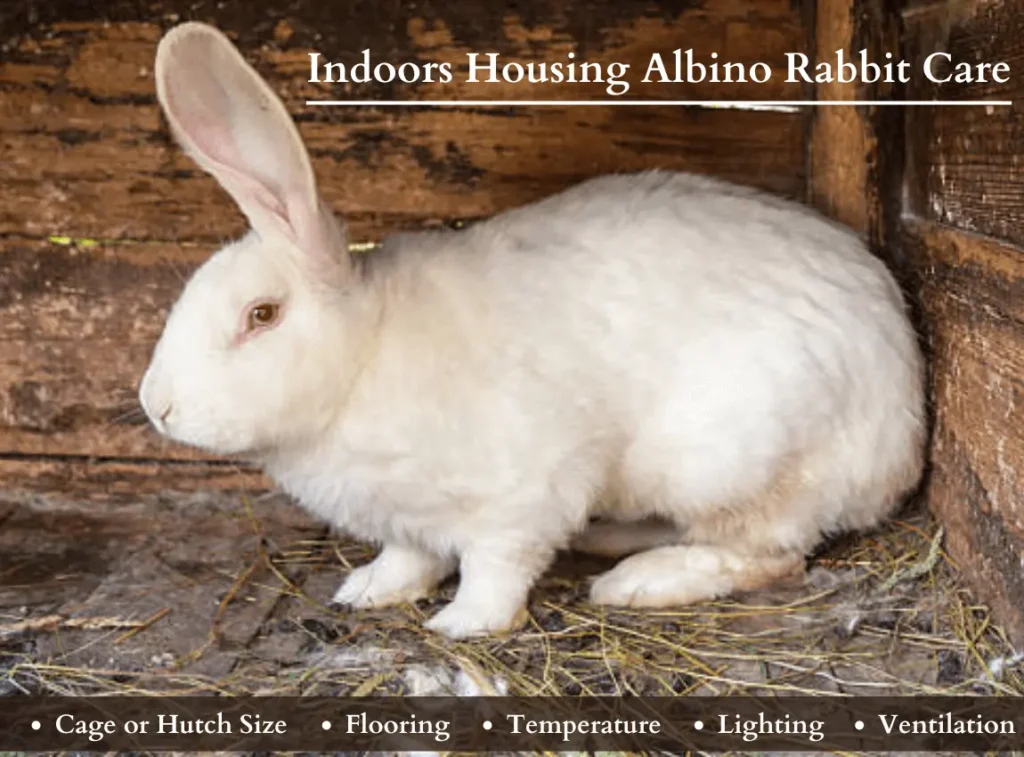
- Cage or hutch size:
Albino rabbits need plenty of space to move around. The recommended minimum space for a rabbit is 1.5 m long and 2 m wide. The space should be large enough for the rabbit to stand on its hind legs without resting its upper body on the floor.
- Flooring:
Use hard floors, not wires as wire floors can cause buttock disease (pododermatitis ulcerans). The floor can be covered with straw, hay or a soft mat.
- Temperature:
The ambient temperature for a rabbit should be between 15 and 21 °C (60-70 °F). Take care of an Albino rabbit because they are particularly sensitive to temperature extremes due to their lack of melanin.
- Lighting:
Albino rabbits are sensitive to bright light. Make sure their cage is in a well-lit area but away from direct sunlight. If the light is too strong, provide a shady place for the rabbit to hide.
- Ventilation:
Proper ventilation is crucial to prevent respiratory issues. Ensure the housing is well-ventilated but free from drafts.
Outdoor Housing Rabbit Care:
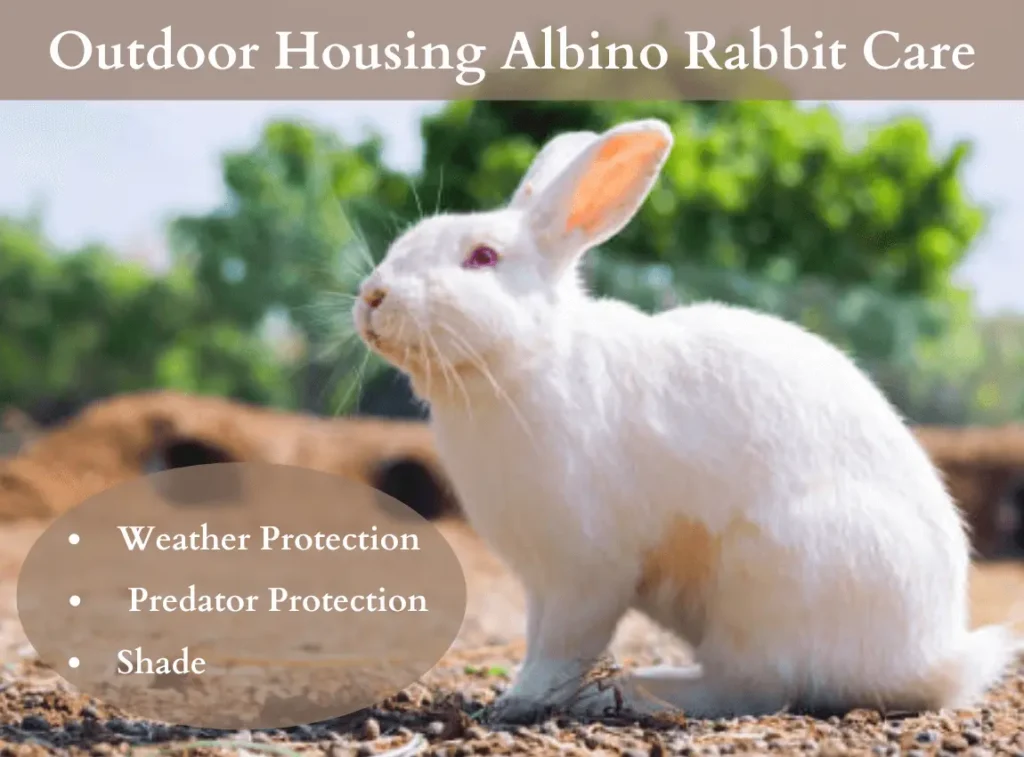
- Weather protection:
If you keep albino rabbits outdoors, provide a weatherproof hutch. Raise the hutch off the ground to prevent moisture and provide insulation in extreme weather conditions.
- Shade:
Albino rabbits need a shaded area to avoid direct sunlight which can damage their eyes and skin. Use a tarp or shade cloth to create shaded areas in their outdoor enclosure.
- Predator protection:
Ensure the outdoor hutch is secure from predators. Use sturdy materials and locks and check regularly for any weak points.
Diet and Nutrition:
Basic Diet:
- Hay: The cornerstone of a rabbit’s diet is high-quality hay such as timothy hay. It supports the digestion and growth of teeth.
- Fresh Vegetables: Provide a variety of fresh vegetables daily including leafy greens like romaine lettuce, kale, and parsley. Avoid iceberg lettuce, as it has little nutritional value.
- Pellets: Use high-fiber pellets specifically designed for rabbits. Avoid those with added seeds, nuts, or dried fruits.
- Fresh Water: Always ensure a constant supply of fresh and clean water. Use a sipper bottle or a heavy ceramic bowl that cannot be easily tipped over.
Treats:
- Fruits: Offer fruits like apples, berries and bananas sparingly due to their high sugar content. Remove any seeds or pits.
- Herbs: Herbs like basil cilantro and mint can be given in moderation as treats.
Supplements:
- Calcium: Albino rabbits may need additional calcium. Consult your veterinarian before adding supplements.
- Vitamin D: Limited exposure to natural sunlight means take care of an albino rabbit they may need a vitamin D supplement. Again consult with your vet.
Health Take Care of an Albino Rabbit:
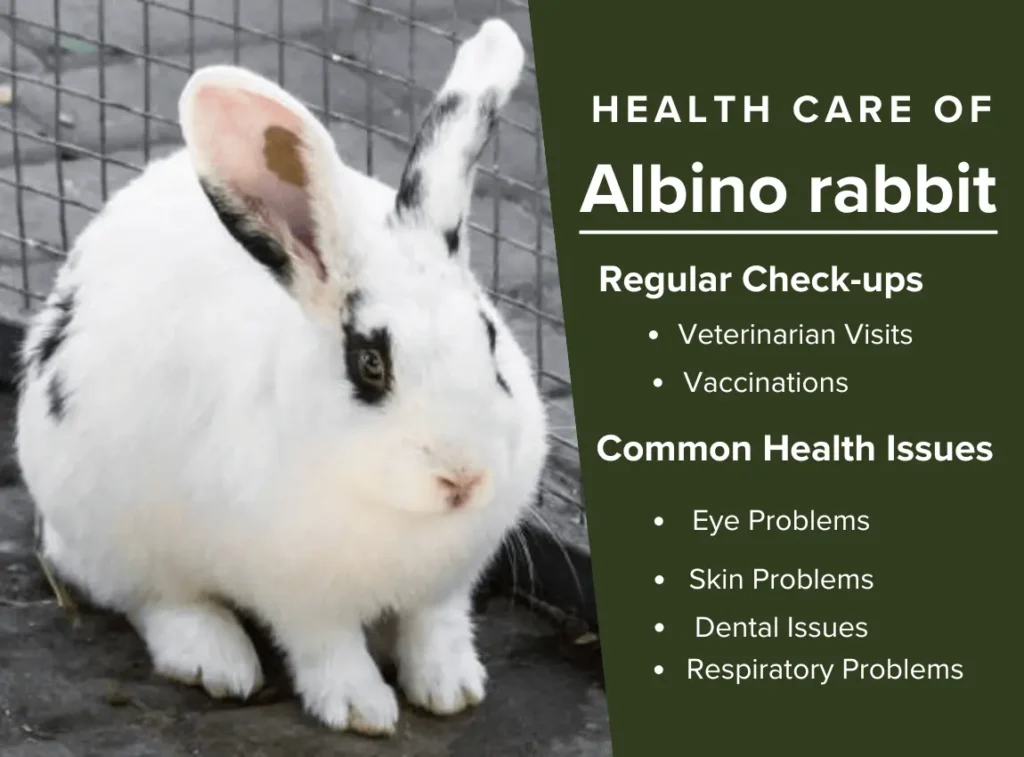
Regular Check-ups:
- Veterinarian visits:
Have regular check-ups with a vet experienced in take care of an albino rabbit. Annual visits are recommended with more frequent visits for older rabbits.
- Vaccinations:
Ensure your rabbit is up-to-date on necessary vaccinations such as the ones for myxomatosis and rabbit hemorrhagic disease (RHD).
Common Health Issues:
- Eye problems:
Take care of an Albino rabbit because they have sensitive eyes and are also susceptible to eye disease. Watch for signs of redness, excessive discharge, and running tears. If any problems arise, contact your vet immediately.
- Skin problems:
Their sensitive skin can be prone to sunburn. Limit their exposure to direct sunlight and use pet-safe sunscreen on exposed areas if necessary.
- Dental issues:
Regularly check your rabbit’s teeth for overgrowth or misalignment. Ensure they have plenty of hay and chew toys to help wear down their teeth naturally.
- Respiratory problems:
Keep living areas clean and dry, with good ventilation to prevent respiratory problems. In case of sneezing, coughing or runny nose consult a veterinarian.
Grooming and Hygiene:
Regular Grooming:
- Brushing: Brush your albino rabbit at least once a week to remove loose fur and prevent matting. During shedding seasons increase the frequency to prevent hairballs.
- Nail Trimming: Trim your rabbit’s nails every 4-6 weeks. If you’re not sure how to do this ask your vet or a professional animal keeper for advice.
- Ear Cleaning: Check their ears regularly for wax buildup, dirt, or signs of infection. Use a damp cloth or an ear cleaner recommended by your vet to gently clean the ears.
Litter Training:
- Litter Box: Use a rabbit-safe litter box filled with paper-based or wood-based litter. Avoid clumping cat litter as it can be harmful if ingested.
- Training: Place the litter box in a corner of their enclosure and place some hay in it to encourage use. Reward your rabbit with treats when he uses the litter box.
Socialization and Exercise:
Social Interaction:
- Companionship: Rabbits are social animals and thrive with companionship. Consider adopting another rabbit as a companion. Ensure they are introduced slowly and monitored closely until they bond.
- Human Interaction: Spend time with your rabbit daily. Pet they gently, speak softly, and offer treats to build trust and strengthen your bond.
Exercise:
- Playtime: Allow your rabbit several hours of supervised playtime outside their enclosure each day. Ensure the play area is rabbit-proofed and free from hazards.
- Toys: offer your rabbits a variety of toys for mental stimulation. Chew toys, tunnels, and puzzle toys can keep them entertained and active.
Safety Considerations:
Household Hazards:
- Electrical Cords: Keep electrical cords out of reach or cover them with protective tubing to prevent your rabbit from chewing on them.
- Toxic Plants: Ensure your home is free of plants that are toxic to rabbits such as lilies, tulips, and daffodils.
- Small Objects: Keep small objects that could be swallowed out of reach.
Outdoor Safety:
- Supervision: When your rabbit is outdoors always keep an eye on it. Even in a secure enclosure, there is a risk of predators or escape.
- Identification: Consider microchipping your rabbit and using a breakaway collar with an ID tag for added safety.
Mental Stimulation:
- Foraging: Hide treats or small amounts of food around their enclosure to encourage natural foraging rabbit behavior.
- Tunnels and Hideouts: Provide tunnels, cardboard boxes, and other hideouts for your rabbit to explore and hide in.
- Chew Toys: Offer a variety of safe chew toys to help keep their teeth healthy and provide mental stimulation.
Handling and Transportation:
Handling:
- Proper Technique: Always support your rabbit’s hindquarters when picking them up. Hold them close to your body to feel safe.
- Avoid Stress: Rabbits can be easily stressed. Handle them to take care of an albino rabbit and avoid sudden movements or loud noises.
Transportation:
- Carrier: Use a sturdy, well-ventilated carrier for transportation. It is covered with a soft sheet for extra comfort.
- Travel Tips: Keep the carrier secure in the car and avoid long trips unless necessary. Ensure your rabbit has access to water during travel.
Emergency Preparedness:
First Aid Kit:
- Contents: Keep a first aid kit for your rabbit including items like gauze, antiseptic, tweezers, and a digital thermometer.
- Emergency Contacts: Have the contact information of your veterinarian and an emergency animal clinic readily available.
Signs of Illness:
- Observation: Monitor your rabbit for any signs of illness such as changes in appetite, lethargy, or abnormal behavior.
- Prompt Action: If you notice any signs of illness so contact your vet immediately. Rabbits can deteriorate quickly so prompt action is crucial.
Also Read: https://thepetlive.com/can-albino-rabbits-see/
Conclusion:
Caring for an albino rabbit requires understanding their unique needs and providing individualized care. Because of their sensitive eyes and skin albino rabbits need protection from direct sunlight and bright light. Proper housing a balanced diet rich in hay, fresh vegetables and clean water and regular veterinary checkups are a must.
Socialization, mental stimulation and regular exercise will keep them healthy and happy. Regular grooming routines, including brushing, nail trimming and ear cleaning help maintain overall rabbit health. By following this guide to albino rabbit care you can ensure your pet has a long, healthy and happy life.
Frequently Asked Question:
What do albino rabbits eat?
Albino rabbits eat a diet primarily composed of high-quality fresh hay such as timothy hay. They should also have fresh vegetables like leafy greens, and a limited amount of high-fiber pellets. Fresh water should always be available. Treats like fruits and herbs can be given in moderation.
How to take care of white rabbits?
White rabbits including albino ones require proper housing away from direct sunlight, a balanced diet, regular grooming, and routine veterinary check-ups. Ensure they have plenty of mental stimulation and social interaction. Protect their sensitive eyes and skin from harsh light and extreme temperatures.
Do albino rabbits have health problems?
Albino rabbits are more prone to certain health problems due to their genetics. They can have eye problems such as photosensitivity and are at risk of sunburn. Regular veterinary care and a well-maintained environment are essential to avoid health problems.
How long do pet albino rabbits live?
Albino pet rabbits typically live between 7 and 10 years and with the right care they can live for 12 years or more. A balanced diet regular veterinary check-ups and a safe and stimulating environment can help prolong your rabbit’s life.
Can albino rabbits see at night?
Albino rabbits have poor night vision due to a lack of pigmentation in the eyes. They rely more on other senses such as hearing and smell for orientation in low light. It is important to ensure that their habitat is safe and free from obstacles.
What food is good for rabbits?
A healthy diet for rabbits includes high-quality hay fresh vegetables (like leafy greens) and a small amount of rabbit-specific pellets. Avoid giving them sugary fruits or high-starch vegetables too often. Fresh water should always be available.
How long do rabbits sleep?
Rabbits sleep between 6 and 8 hours a day usually taking short naps during the day and night. They are crepuscular that is most active at sunrise and sunset and usually rest during the day and late at night.
